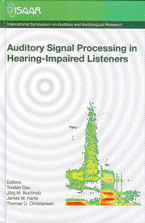Auditory compensation for reverberation in normal hearing listeners
Resumé
The present study investigates the ability of the auditory system to compensate for the immediate effect of reverberation on speech intelligibility. In the experiments, the spectro-temporal properties of a speech signal are modi ed by reverberation that smears the signal. Reverberation can be viewed as a natural lowpass modulation lter and generally reduces speech intelligibility. However, recent research has shown that the auditory system appears to compensate for this effect by taking the reverberant environment into account (Watkins, 2005). This compensation mechanism is functional after a short adaptation period (less than 1 s) and enhances the ability of the auditory system to detect smeared speech modulations. In the present study, the compensation mechanism was investigated in a simulated room with a high degree of reverberation. Two experimental setups were used in order to verify the existence of compensation for reverberation, but the results of the experiments could not confirm the earlier ndings of Watkins (2005).
Referencer
Houtgast, T., and Steeneken, H. J. M. (1985). “A review of the MTF concept in room acoustics and its use for estimating speech intelligibility in auditoria," J. Acoust. Soc. Am. 77, 1069-1077.
Watkins, A. J. (2005). “Perceptual compensation for effects of reverberation in speech identification,” J. Acoust. Soc. Am. 118, 249-262.
Yderligere filer
Publiceret
Citation/Eksport
Nummer
Sektion
Licens
Authors who publish with this journal agree to the following terms:
a. Authors retain copyright* and grant the journal right of first publication with the work simultaneously licensed under a Creative Commons Attribution License that allows others to share the work with an acknowledgement of the work's authorship and initial publication in this journal.
b. Authors are able to enter into separate, additional contractual arrangements for the non-exclusive distribution of the journal's published version of the work (e.g., post it to an institutional repository or publish it in a book), with an acknowledgement of its initial publication in this journal.
c. Authors are permitted and encouraged to post their work online (e.g., in institutional repositories or on their website) prior to and during the submission process, as it can lead to productive exchanges, as well as earlier and greater citation of published work (See The Effect of Open Access).
*From the 2017 issue onward. The Danavox Jubilee Foundation owns the copyright of all articles published in the 1969-2015 issues. However, authors are still allowed to share the work with an acknowledgement of the work's authorship and initial publication in this journal.


